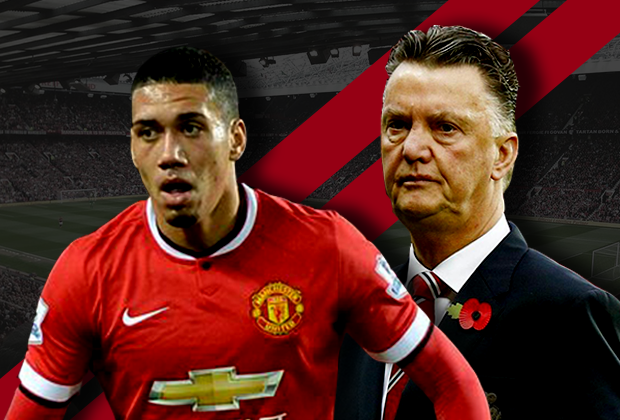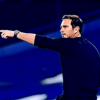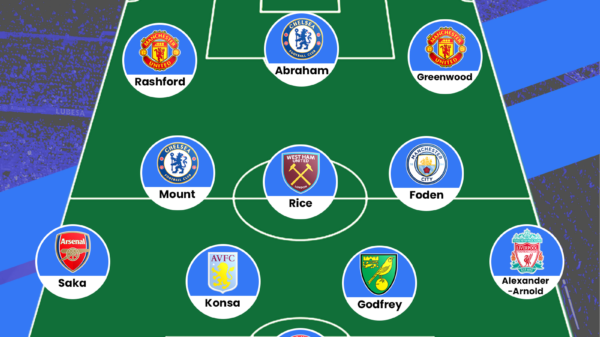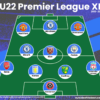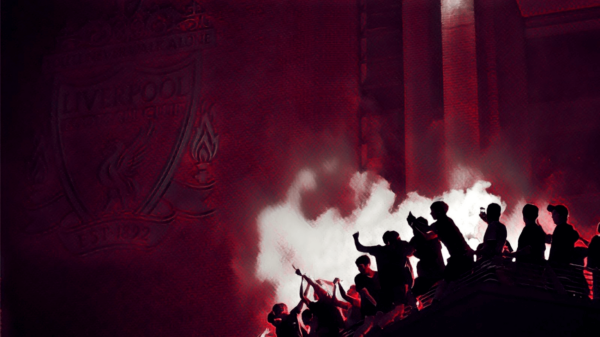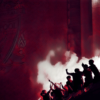Many had thought that Chris Smalling’s days at Manchester United were numbered after a few blunders at the start of this season but the 25 year-old has come back hard and strong. Here is Rahul Natrajan with more on the matter.
When an inexplicable red mist descended upon Chris Smalling at the Etihad in November of 2014, many Manchester United fans believed it was the end of the line for the English centre back. His first half sending off consisted of two silly yellows: one for foolishly impeding Manchester City’s Joe Hart on a punt, and the second, with the knowledge of already being cautioned, for a reckless challenge on Sergio Aguero, in a position that did not pose an immediate goal threat. These two moments of madness, eight minutes apart, essentially ended United’s chances of rectifying their recent derby woes and getting their season back on track. The fact of the matter was that this early season Manchester derby was a winnable game against a poor Manchester City team; even with ten men, Louis van Gaal’s team ran the champions close, but ultimately left the blue half of Manchester with nothing as Sergio Aguero yet again proved to be the difference. That result left United in 10th place, with only 13 points from their first 10 games. Unsurprisingly, Smalling was made the scapegoat of the defeat, and it seemed as if his United career was over.
However, Smalling, perhaps fortuitously, returned to the starting XI immediately after serving his one game suspension, for the trip to Arsenal. Despite his red card being branded “stupid” by van Gaal, Smalling started at the center of United’s back three at the Emirates, although his return to the XI was aided by injuries to the likes of Phil Jones, Marcos Rojo, and Jonny Evans, as United’s back line also featured youngsters Paddy McNair and Tyler Blackett. If Smalling wanted to redeem himself for his grave error at the Etihad, the first half certainly provided no evidence for that as Arsenal scythed through United’s defense on numerous occasions; luckily for the Red Devils, David de Gea was in inspired form as he repelled Arsenal each and every time. The second half provided a better account of Smalling, as he marshaled a valiant—albeit somewhat lucky—United rearguard in a smash-and-grab 2-1 win.
Arsenal provides an excellent parallel for Smalling’s season, and perhaps, his United career. His quest for redemption began away at Arsenal, and in the reverse fixture at the end of the season, Smalling captained Manchester United for the first time. Over the course of the 2014/15 season, Chris Smalling has established himself as a mainstay in the United backline, earning himself a new long-term contract. Even with yet another big money transfer window looming and with defensive reinforcements expected, Smalling’s place in van Gaal’s first team is secure, as the former Fulham man has become the defensive leader United fans were crying out for after the departures of Nemanja Vidic, Rio Ferdinand, and Patrice Evra.
While Manchester United’s defense was much maligned throughout the year, at one point in the season, the Red Devils had the third best defensive record in the league, only behind Southampton and eventual champions Chelsea, finally finishing fourth on the charts behind the aforementioned duo and third placed Arsenal. While much of this statistic is owed to the sensational David De Gea, Smalling was extremely impressive in the second half of the season. The game that perhaps turned his United career around was the home fixture against Burnley in early February; surprisingly, it was his attacking prowess that stood out, as his first half brace overcame a spirited Burnley display in a 3-1 win. While his goals stole the headlines, his colossal defensive display against a physical Burnley secured a much needed 3 points. That game marked Smalling’s return from yet another injury problem, which the 25 year-old is no stranger to. Since joining United in 2010, the Englishman has endured 19 different spells on the sidelines through injury; after the Burnley game, however, Smalling played in all but two of the remainder of United’s games. This consistent run of fixtures has allowed Smalling to evolve into a top class defender: practice makes perfect, and van Gaal’s philosophy is no exception. The Dutchman’s defensive system is complex and precise, with a set of predetermined movements dictating the structure. At times this season, United’s defending has been comical due to a ridiculous lack of cohesion. There seemed to be a sheer absence of any sort of understanding between United’s defenders, but this comes as no surprise as United’s injury woes forced van Gaal into continuously chopping and changing his backline: by the end of the Crystal Palace game in early November, Manchester United had featured 15 different combinations at the back. As a result, Smalling’s continued presence in the starting XI allowed him to truly comprehend himself with van Gaal’s set up.
Furthermore, van Gaal’s system often features defenders challenging opposition players in midfield; while Smalling can play this role, as he did most notably against Harry Kane at Old Trafford, the Englishman has stood out in his capacity to sweep up any missed interceptions or mistimed tackles. Early in the season, many United fans clamored for the partnership of Phil Jones and Marcos Rojo; however, this pairing led to some calamitous errors as both Jones and Rojo are hyper aggressive center backs who love to step out of the backline to retrieve possession. Smalling provided the missing link, as his ability to stay steadfast and clean up mistakes proved invaluable for the Red Devils. In this role, Smalling naturally matured into a leader that truly anchored van Gaal’s defense. Smalling, who began his career at non-league Maidstone United, became the player who organized a young backline but also covered for the inevitable mistakes with brilliant blocks, interceptions, and last-ditch tackles. Previously seen as a clumsy, gangly defender, Smalling started to take advantage of his impressive physical assets of pace and power. Despite being continuously put in situations that demanded challenges, Smalling ended the season with only one more card to his name after the City debacle—in the final game of the season against Hull City.
By no means is Smalling the perfect defender, however; he currently isn’t a defensive colossus at the level of a John Terry or a Thiago Silva. His positioning, while much improved, is still faulty, and this is unfortunately a problem each member of United’s young backline seems to possess. Smalling’s physical capabilities however allow him to make up for such lapses in judgment. Another aspect that needs to improve is his performance on one-on-ones; Smalling’s slow reactions hinder him from truly dominating individual duels, aside from aerially. In the past, the Englishman has been criticized for his ability on the ball; this weakness seemed to signal the end of Smalling’s career at United, as van Gaal is known to demand center backs adept at distribution from the back. Much of the criticism was unwarranted as they seemed to stem from his lackluster performances as a makeshift right back. Even so, Smalling has truly stepped up his game this season and has become more composed on the ball. While he will never be a defender in the mold of a classic Ajax style ball-playing center back, Smalling has proven himself to be more than capable at bringing the ball out from the back. In this sense especially, the England international has shown his leadership qualities as Smalling has demonstrated his lack of fear of getting attacks started by dribbling out of the backline and driving the whole team forward.
In the end, the criticism directed towards Manchester United’s defense is both justified and unjustified. On certain occasions, you truly wonder whether van Gaal has recruited Sunday League members and has them posing as Premier League defenders. But United’s defensive record speaks for itself, de Gea or no de Gea. Personally, I believe in the capabilities of each of United’s defenders; individually, each has the potential to become a top-level defender, but they have rarely shown cohesion as a unit. With the relative youth of the likes of Smalling, Rojo, Jones, Shaw, and McNair, mistakes are unfortunately inevitable, and opponents have seized upon and capitalized on these mistakes because of the lack of cohesion. However, Chris Smalling has truly stepped up his game at a moment when his United career seemed at a crossroads. The 25 year-old has matured into a wonderfully solid defender who van Gaal can rely upon. Just as Arsenal provided a parallel, a more dramatic parallel would be Manchester City. The end seemed nigh when Smalling was sent off at the Etihad, but in April of 2015, at perhaps the peak of United’s season, Smalling put the sword through Manchester City with his fourth goal of the season. His passionate celebration told the tale; this was a man who had experienced the lowest point of the Manchester derby, and was now experiencing the highest point in the same contest. While his story of redemption was nowhere near as drastic or dramatic as those of Ashley Young and Marouane Fellaini, Chris Smalling has gone from being a scapegoat to now one of the first names on van Gaal’s team sheet. Regardless of the big money reinforcements brought in this summer, Chris Smalling has established himself in Manchester United’s starting XI, and I believe he will stay there for years to come.
Written by Rahul Natrajan
- A Tribute to Robin van Persie - July 23, 2015
- Chris Smalling: Redemption Achieved? - June 10, 2015
- The story of Ashley Young’s resurgence under Louis van Gaal - April 29, 2015




















































